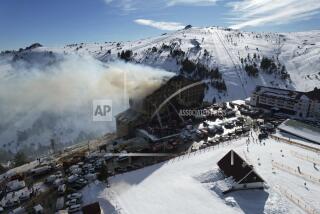Fire Safety for Hotel Guests
- Share via
When guests book a hotel room, most ask about rates, beds and check-out time. Often neglected is the potentially life-saving question: Are the rooms equipped with sprinklers and smoke detectors?
If this is a question you ask regularly, you greatly increase your chances of surviving a hotel blaze. When used in tandem, sprinklers and smoke detectors can prevent up to 90% of fire deaths, according to the U.S. Fire Administration, the fire safety branch of the Federal Emergency Management Agency.
Since the early 1980s, the number of U.S. hotel and motel blazes has dropped by half, due to improvements in building codes and better design of combustible materials such as mattresses. Still, about 33 people die each year in U.S. hotel or motel fires, according to Julie Reynolds of the National Fire Protection Assn., a Massachusetts-based nonprofit fire safety organization, and another 362 are injured. From 1987 to 1991, the number of hotel/motel fires averaged 7,000 blazes annually, ranging in intensity from smoldering wastebaskets to major fires.
To further ensure travelers’ safety on the road--in part spurred by recent legislation--hotels are becoming increasingly safety-conscious.
*
Under the Hotel and Motel Fire Safety Act of 1990, hotels and motels that do not install smoke detectors and sprinklers can miss out on business from federal employees, since the measure restricts federal business travel to complying facilities. At the moment, government employees are only encouraged to stay at approved hotels and motels, but by 1996, 90% of employees will be required to do so. And effective Monday, federally financed meetings and conferences can take place only at hotels and motels in compliance with the act, unless a waiver is obtained.
The other good news is that more than 98% of 12,000 U.S. hotels and motels surveyed in a 1992 study already had smoke detectors (sprinkler use was not surveyed), according to the American Hotel & Motel Assn. study.
Sprinkler installations are also becoming more common, said Ray Ellis, an American Hotel & Motel Assn. consultant who said most major chains install them. While the Fire Safety act requires sprinklers for hotels of three stories or higher, Ellis said the trend is to equip lower floors, as well. When asking about a hotel’s sprinkler systems, he advises travelers to find out if the entire facility is equipped, since fires often start in meeting rooms and restaurants.
Information about fire safety is often included in guidebooks. For several years, the American Automobile Assn. tour books have noted the presence of sprinklers and smoke detectors in lodging listings.
Fire safety measures are gaining steam in overseas hotels, too, said Ellis, citing the United Kingdom, Germany and the Netherlands as particularly safety-conscious.
*
There are a number of other ways travelers can minimize fire risks, according to suggestions from the National Safety Council, the American Hotel & Motel Assn. and the National Fire Protection Assn.
* “When you check in, ask what the fire alarm sounds like,” said Reynolds. Ask if the facility has an evacuation plan.
* Once at your room, find the two exits nearest your room. Note whether you turn right or left when leaving the room to reach each exit. “Count the doors between your room and the exit,” said Reynolds. That way, if fire breaks out and the hallway is smoke-filled, you can crawl low (to minimize deadly smoke inhalation) and count doorways.
* Find the fire alarm on your floor.
* Examine the windows in your room to see if they can be easily opened.
* Keep your room key and a small flashlight at bedside. Practice unlocking your door from the inside in the dark.
* Don’t smoke in bed or carelessly in any other way. A third of fatal hotel fires are traced to careless smoking, according to the National Fire Protection Assn.
* If fire breaks out in your room, grab the key and leave, closing the door. Sound the fire alarm or alert hotel workers and notify neighboring guests. Walk to safety. Never use an elevator.
* If you hear a fire alarm and your door is not hot, call the front desk for information about exactly where the fire is or check the hallway for smoke. If there isn’t any, leave. Grab the key and flashlight and close the door securely before walking to the nearest exit.
* If you hear a fire alarm and your door is hot or there is smoke in the hallway, stay in the room and await rescue. If the telephone works, call for help and give your room number.
* Fill the bathtub with water to wet sheets and towels, then use them to seal the door.
* If your window opens, hang a sheet out to let rescuers know your location, but don’t climb down the sheet. Listen closely for firefighters’ instructions.
* If smoke invades the room, use another blanket or sheet to make a tent over your head. Stand by a window, if possible, to breathe smoke-free air.
More to Read
Sign up for The Wild
We’ll help you find the best places to hike, bike and run, as well as the perfect silent spots for meditation and yoga.
You may occasionally receive promotional content from the Los Angeles Times.






